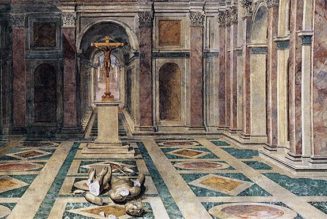Instability shakes Western civilization. The worldwide government turns to active persecution of Christians. Confusion strikes the heart of the Church, where the faithful’s loyalties are divided between two men claimed to be the heir of St. Peter.
That sounds like a summary of recent headlines, but it’s nothing the Church hasn’t endured before. The exact same scenario played out in the third century crisis of Pontian and Hippolytus.
Hippolytus was a leader of the Roman church during the pontificate (c. 199–217) of St. Zephyrinus, whom he attacked as being a modalist (one who conceives that the entire Trinity dwells in Christ and who maintains that the names Father and Son are only different designations for the same subject). Hippolytus, rather, was a champion of the Logos doctrine that distinguished the persons of the Trinity. He conceived of God as a unit who, while indivisible, was plural. In ethics he was conservative—being scandalized when Calixtus (successor of Zephyrinus) took measures to extend absolution to graver sins such as adultery—and he regarded the church as a society composed exclusively of the just.
Theological note: As bad as the situation is today, Catholics should be grateful to live in a time when the question of whether grave sins can be absolved through the sacrament of Penance has been settled in the affirmative.
Getting back to Hippolytus, he was a leading theologian of his day, having influenced such heavyweights as Origen. Hardly any of his work survives today, though–a stark reminder of how much history has been lost.
Although Hippolytus’ reputation as a scholar and his literary talent were assets to his cause, the church chose Calixtus for the papacy when Zephyrinus died. In disgust, Hippolytus withdrew from the Roman community and headed a dissident group that consecrated him.
Not even his expertise as a world-class theologian prevented Hippolytus from becoming the first antipope and leading many Christians into schism. Let his error stand as a lesson. Without God, even the wisest man can do nothing.
That same lesson applies on the macro scale. The first pope-antipope controversy raged for thirteen years. It’s downright miraculous that Christianity survived such a severe crisis so early on.
Yet the story of Antipope Hippolytus has one more lesson in store for modern Catholics tempted to despair:
[Hippolytus] reigned in opposition to the succeeding pontificates of Saints Urban I (222–230) and Pontian (230–235), with whom he was exiled to the mines of Sardinia in 235 during the persecution of Christians by the Roman emperor Maximinus. There he became reconciled with Pontian and exhorted his supporters to unite with Rome. Before dying as martyrs, both resigned to allow for a successor, St. Anterus (235–236), thus ending the schism. Pope St. Fabian (236–250) had their corpses brought to Rome for solemn burial.
To sum up, as early as the third century, the Church faced a pontifical succession crisis involving a papal resignation, confusion among the faithful as to who the real pope was, and state-enforced persecution.
And even though that crisis descended into outright schism, in the end the warring claimants were reconciled and the schism healed.
Not only that, the persecution produced multiple martyrs to glorify God, one of whom bears the title Antipope Saint Hippolytus.
Which would seem to clarify God’s opinion on whether grave sin can be absolved through Reconciliation.
Never despair. The God who can create good from nothing can bring about greater good from suffering.
“Couldn’t put this one down!”
Join Our Telegram Group : Salvation & Prosperity










